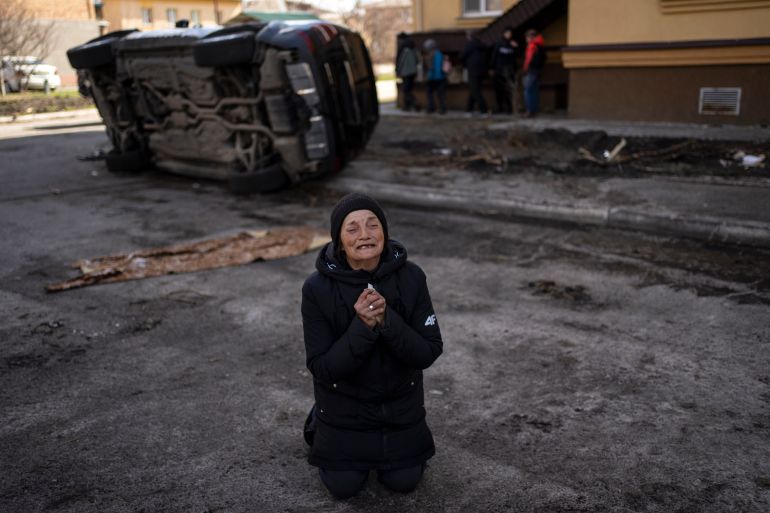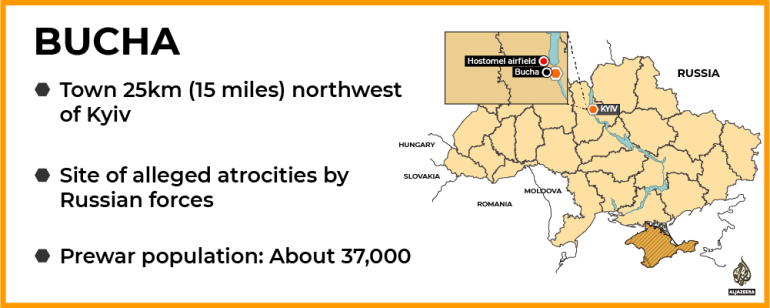Russia’s sixth week of war in Ukraine saw atrocities. What next?
As we review the events that unfolded in week 6, an expert says Russia may move now to take the port of Odesa.

As Russian forces prepared to redeploy from Kyiv to the eastern Donbas region in the sixth week of the war in Ukraine, the towns and villages they evacuated were found strewn with the corpses of tortured and mutilated civilians.
In the town of Bucha, northwest of Kyiv, the mayor estimated that 300 people had been killed.
Keep reading
list of 4 itemsUkraine forces appear to kill captured Russians in video: Report
Meduza editor: ‘Russia’s state media is terrifyingly effective’
The Russia-Ukraine war through the eyes of a teenager
Reporters found dozens of bodies in two mass graves, and residents gave Al Jazeera gruesome descriptions of harassment and threatened killing.
Human Rights Watch said it documented war crimes by Russian forces in the areas of Kyiv, Kharkiv and Chernihiv, in northern Ukraine, including a case of repeated rape and two cases of summary execution. One of those executions was in Bucha on March 4, the group said.

“You may remember, I got criticised for calling [Russian President Vladimir] Putin a war criminal,” said US President Joe Biden on April 4. “Well, the truth of the matter – you saw what happened in Bucha. This warrants him – he is a war criminal.”
Russian defence and foreign ministries have denounced the reports of war crimes.
“The video material can’t be trusted, as our specialists from the defence ministry detected signs of video forgery and various fakes … We would require many world leaders not to rush with statements, groundless accusations,” said Kremlin spokesman Dmitry Peskov on April 4.
The United States, France and Germany expelled dozens of Russian diplomats in response to the alleged atrocities. Other European Union members followed suit.
The United Nations Security Council has been unable to criticise Russia due to the fact that Russia is a permanent member with veto power. On April 5, Ukrainian President Volodymyr Zelenskyy advised the UNSC to remove Russia or dissolve itself.
Reorientation
The towns surrounding Kyiv were evacuated as part of a Russian plan to focus its firepower in the east of the country.
Pentagon spokesman John Kirby said on March 30 that about a fifth of Russian forces besieging Kyiv, Chernihiv and Sumy in the north of the country were being withdrawn.
Retired Greek lieutenant-general and an expert on security issues, Andreas Iliopoulos, told Al Jazeera he believes Russia will soon move to take the port of Odesa in the west, thus completing its conquest of the Ukrainian littoral and turning the Black Sea into “a Russian lake”.
“An amphibious landing to take Odesa is an easy matter for Russia, which has superiority in the Black Sea,” he said.
Three Russian missiles are reported to have hit an oil refinery on the city’s outskirts on April 1, in what may have been the opening salvo of the battle of Odesa. The attack occurred during a visit by the Greek foreign minister to the city’s large ethnic Greek minority.
Iliopoulos believes part of this second phase of operations will be the conquest of “the areas east of the Dnieper River, to encircle the Ukrainian forces there and force them to surrender … While Ukrainian forces remain there, they will be a Russian target.”
Russia’s ultimate goals in Ukraine have gradually become clear, Iliopoulos told Al Jazeera.
“Russia’s strategic goals will be to partition Ukraine along the Dnieper river, with Russia taking the east side. It will seek to cut off Ukraine’s access to the Black Sea, and to take over nine of Ukraine’s fifteen nuclear power plants,” said Iliopoulos, an ex-marine who until recently served as deputy chief of the Hellenic Army.
“[Russia] will then have the richest part of Ukraine, which contains all of its natural gas and exportable metals, and then it will sit down to negotiate. But I don’t think it’ll give anything back. You don’t sign away what you’ve won by blood.”
‘Putin is being misinformed’
Russia recognised Ukraine’s eastern regions of Luhansk and Donetsk as independent republics on February 21, days before the invasion began.
More than a month later, Foreign Minister Sergey Lavrov told state television that the strategic importance of Russia’s campaign in Ukraine was to re-establish Moscow as an equal to Washington and Beijing on the world stage.
“The unipolar world is irretrievably receding into the past and a multipolar world is being born,” Lavrov said on March 31. “There won’t be one single ruler in this new reality. All key states with a decisive influence on the world economy and politics will have to come to terms … Nobody on Earth will be considered a second-rate player.”
US and Western observers have expressed doubts about whether the Russian military can achieve these aims.
“We believe that Putin is being misinformed by his advisers about how badly the Russian military is performing and how the Russian economy is being crippled by sanctions because his senior advisors are too afraid to tell him the truth,” Kate Bedingfield, White House communications director, told reporters on March 31.
Meanwhile, the European Bank for Reconstruction and Development has predicted that Russia’s economy will shrink by 10 percent this year and Ukraine’s by 20 percent.
They had been forecast to grow by 3 percent and 3.5 percent, respectively. It believes growth will fall to a meagre 1.7 percent in the territories where it operates in Eastern Europe, Central Asia and the East Mediterranean, down from an original forecast of 4.2 percent.
Shoring up the rouble
On March 31, Putin said countries sanctioning Russia must pay for their gas imports in roubles.
“If such payments [in roubles] are not made, we will consider this a default on the part of buyers, with all the ensuing consequences. Nobody sells us anything for free, and we are not going to do charity either – that is, existing contracts will be stopped,” Putin said.
Although a deadline was set for April 1, the Kremlin later extended it by several weeks.
“Payment for actual [gas] deliveries that are going on now does not need to be made today, and it should be made at the end, in the second half of the month of April, or even at the beginning of May,” Peskov told reporters.
Lavrov explained the reasons for rouble-denominated sales during a visit to New Delhi on April 1.
“We do not want to depend on a system, which could be closed at any time. And we do not want to depend on a system which has masters who can steal your money overnight,” Lavrov said, referring to the freezing of Russian Central Bank assets held in Western banks, and Russian institutions’ suspension from the SWIFT global interbank system.
A second reason might be to shore up the value of the rouble, which has suffered depreciation under sanctions pressure.
In the months preceding its invasion, Russia lowered gas sales to Europe to the lowest level possible without disturbing long-term contracts. Now it threatens to trigger default clauses, allowing it to legally stop deliveries on those contracts.
An interruption of gas flows would be a shock to Europe, which depended on Russia for a third of its gas last year. The European Commission has said it would take the EU a year to replace two-thirds of those imports.
Germany, Russia’s biggest EU client, has refused to pay for its gas in roubles, while Russia-friendly Hungary, also a member of the bloc, has said it would meet this demand.
On April 6, Germany was updating its Renewable Energy Sources Act to make the country’s electricity generation fossil fuel-free by 2035. Its previous goal was 2050.